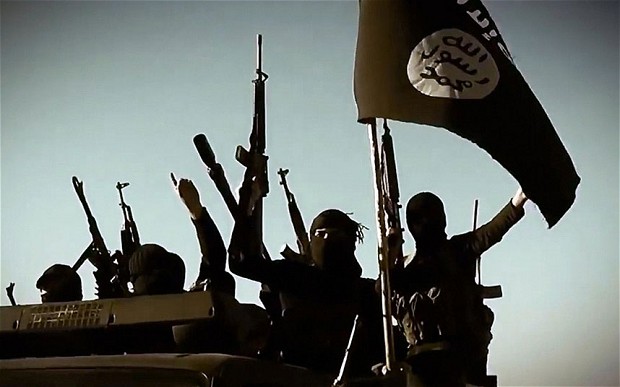The modern politics of the Middle East resurfaces once more on the international agenda. Concern is growing over the multifaceted problem of political instability, this time in the case of Iraq, namely over the capture of its central and northern parts by extremist Sunni militants. The actions of the Islamic State of Iraq and al-Sham (ISIS) permit the development of an analysis of the wider regional frame from both a historical and an actual standpoint. This article will revolve first around the events that accumulated over a greater time period, thus leading to the actual situation, afterwards around the theoretical frame of ISIS’s purposes and actions and, finally, the situation will be adressed through perspectives on the future.
If we are to understand the rationale that is fueling ISIS’s working, we should look no further than the date of June 29th 2014, when this grouping presented the world with a video through which its motives are unveiled. The name itself of the respective video is elucidatory: ‘The End of Sykes-Picot’. They contend that what sparked the unfair Middle Eastern situation of nowadays is the iniquitous agreement between the French and the British back in 1916, when the territories of what was the Ottoman Empire were split among the successful colonial powers. Although it has been argued that, indeed, these machinations have brought about artificial states and borders, the reasoning behing ISIS’s video is deemed spurious by Glen Rangwala from Cambridge University.
Continuing on the historical path, after the British conceded the control of the territory to the Hashemite dinasty, namely to King Faisal, Iraq achieving independence in 1932, various coups plunged the country into chaos. The monarchy was abolished in 1958 by Abd al-Karim Qasim, but his regime, too, was overthrown in 1968, when the Ba’ath party took power. A new figure rose to prominence soon afterwards and that is Saddam Hussein, who was the ruler of Iraq from 1979 to 2003. It is under Saddam’s rule that the country became entangled in various conflicts, beginning with the First Persian Gulf War in 1980, when Iraq declared war on Iran and continuing with Iraq’s invasion of Kuwait in 1990. Although the 1980 conflict produced a stalemate, the 1990 reply of the international community was swift and unerring, so the Iraqi forces were crushed. The UN attempted to determine Saddam Hussein to dismantle Iraq’s weapons of mass destruction, but his failure to do so determined the UN to impose sanctions on the country. Moreover, in 2003, a coalition that was led by the United States attacked Iraq for not complying with UN’s dispositions.

Saddam Hussein during the Iran-Iraq War
The war on Iraq has been relentless and only in 2009 did the US agree to retire their troops from cities. There are various interpretations of what happened afterwards. A power vacuum may have been provoked by the US troops’ withdrawal, but the Iraqi authorities claimed that the civilian death toll was at its lowest since 2003. On these grounds, the Americans retired completely in 2011, but violence soon escalated. The Sunni minority of the population didn’t feel itself properly represented by Prime Minister Nouri al-Maliki, who assumed office in 2006. A New York Times opinion article signed by Rafe al-Essawi and Atheel al-Nujaifi claims that al-Maliki is a sectarian-minded Shiite Muslim with authoritarian tendencies, and that Sunni Muslims are perpetually suffering abuse at the hands of governmental forces.
With this background in mind, the rise to power of ISIS is more easily understood. The Civil War in Syria secured a territorial connection between the two countries and now these extremist Sunnis make an appeal to muslisms around the world for a jihad. ISIS stems from al-Qaeda, but the mother-movement disavowed ISIS earlier in 2014 on grounds of indiscriminate use of violence. It goes without saying that ISIS is the perpetrator of gruesome, violent acts, most of these being directed against Shiite Muslims and Christians, but it is considered that the Sunni Iraqi minority finds a lesser harm in ISIS than in Prime Minister’s al-Maliki abusive practices.

Iraqi Prime Minister Nour al-Maliki
What is unique about the purposes of ISIS is the willingness to fight in order to impose itself as a state, just as it is suggested by its name. The grouping’s Shura Council was presented with chief spokesman’s Abu Mohammed al-Adnani declaration about wanting to impose the “restoration of the caliphate”. The Caliphate has been abolished in 1924, when the Ottoman Empire crumbled, so ISIS’s claims are even in this respect anti-colonial, being seen as a form of restoring what was made to perish by the European forces.
A consequence of utmost importance that is to be derived from this context is that of the strive for independence of the Kurds. Historically, not only weren’t the Kurds allowed to evolve from a political point of view to achieve statehood, but they were also indiscriminately persecuted. One of the most notorious cases is the al-Anfal Campaign of 1988, when the Baghdad government under Saddam Hussein ordered the elimination of the Kurdish population from the northern province of Iraq. These challenges notwithstanding, in July 2014 the president of the Kurdistan region, Masoud Barzani, announced the region’s determination to eventually achieve full-scale independence: It is also difficult for us to keep waiting for an uncertain future, waiting in vain for implementation of the constitution and our rights. Kurds have no choice but to think of another path, toward self-determination.

Even though the challenges that arose for the Iraqi government seem a daunting task to tackle, when F. Gregory Gause III of Brookings Institution Doha Center was interviewed, he deemed the victory of ISIS implausible, albeit further splintering of governing authority may be in sight. This shows that although the government may manifestly fail to assure the cohesion of the country, taking into account the eterogenous population, this crisis also entails the hope for further intervention.
All in all, there have been many casualties, especially among civilians, which is starting to awaken the international community. This may be a good thing, as some groups dislike prime-minister Maliki. However, others support his government, so will this manage to change anything?
Image sources:
- http://www.telegraph.co.uk/news/worldnews/middleeast/iraq/10910868/Iraq-crisis-Obama-may-launch-air-strikes-without-Congress-amid-calls-for-Maliki-to-go-live.html
- http://blog.inkerman.com/index.php/2014/06/23/the-isis-crisis-a-return-to-civil-war-in-iraq/
- http://en.wikipedia.org/wiki/Saddam_Hussein
- http://jafrianews.com/2011/04/25/no-plans-to-extend-us-presence-iraqi-pm-maliki/iraqi-pm-nouri-al-maliki/
- http://adst.org/2014/06/persecution-of-the-kurds-the-documents-of-saddams-secret-police/
Sources:
- http://www.e-ir.info/2014/07/26/the-islamic-state-and-the-international-politics-of-statehood-in-the-middle-east/
- Cristopher Catherwood, “A brief history of the Middle East. From Abraham to Arafat“, Carroll & Graf Publishers, New York, 2006, pp. 202-204
- http://www.un.org/depts/unmovic/documents/1441.pdf
- http://www.reuters.com/article/2009/11/30/us-iraq-toll-idUSTRE5AT3ZE20091130
- http://www.bbc.com/news/world-middle-east-16234723
- http://www.nytimes.com/2014/07/28/opinion/Let-Sunnis-Defeat-Iraqs-Militants.html?_r=0
- http://english.alarabiya.net/en/variety/2014/07/26/ISIS-jihadist-posts-grisly-picture-online-of-fighter-posing-with-human-heads.html
- http://www.washingtonpost.com/world/middle_east/al-qaeda-disavows-any-ties-with-radical-islamist-isis-group-in-syria-iraq/2014/02/03/2c9afc3a-8cef-11e3-98ab-fe5228217bd1_story.html
- http://www.huffingtonpost.com/2014/07/25/islamic-state-monastery_n_5620623.html
- http://www.independent.co.uk/news/world/middle-east/isis-declares-new-islamic-state-in-middle-east-with-abu-bakr-albaghdadi-as-emir-removing-iraq-and-syria-from-its-name-9571374.html
- http://www.zeit.de/politik/ausland/2014-06/kalifat-isis
- http://news.bbc.co.uk/2/hi/middle_east/4877364.stm
- http://www.aljazeera.com/programmes/talktojazeera/2014/07/masoud-barzani-kurdish-independence-201471719176616433.html
- http://www.cfr.org/iraq/can-iraq-survive-isis-storm/p33143












